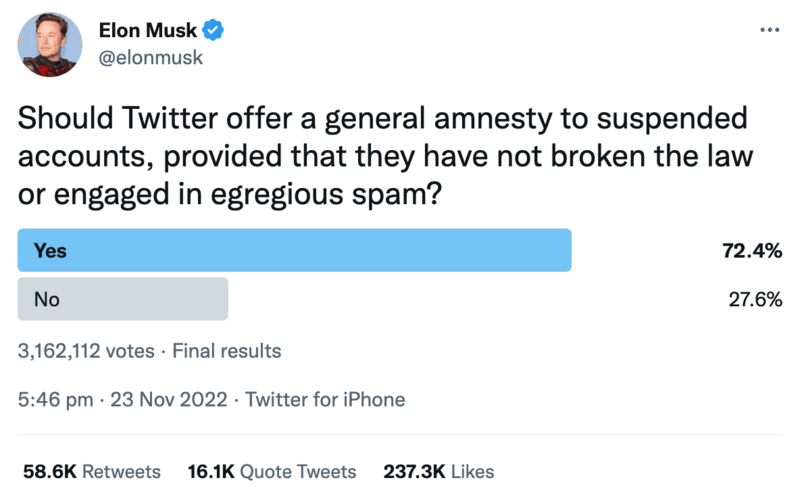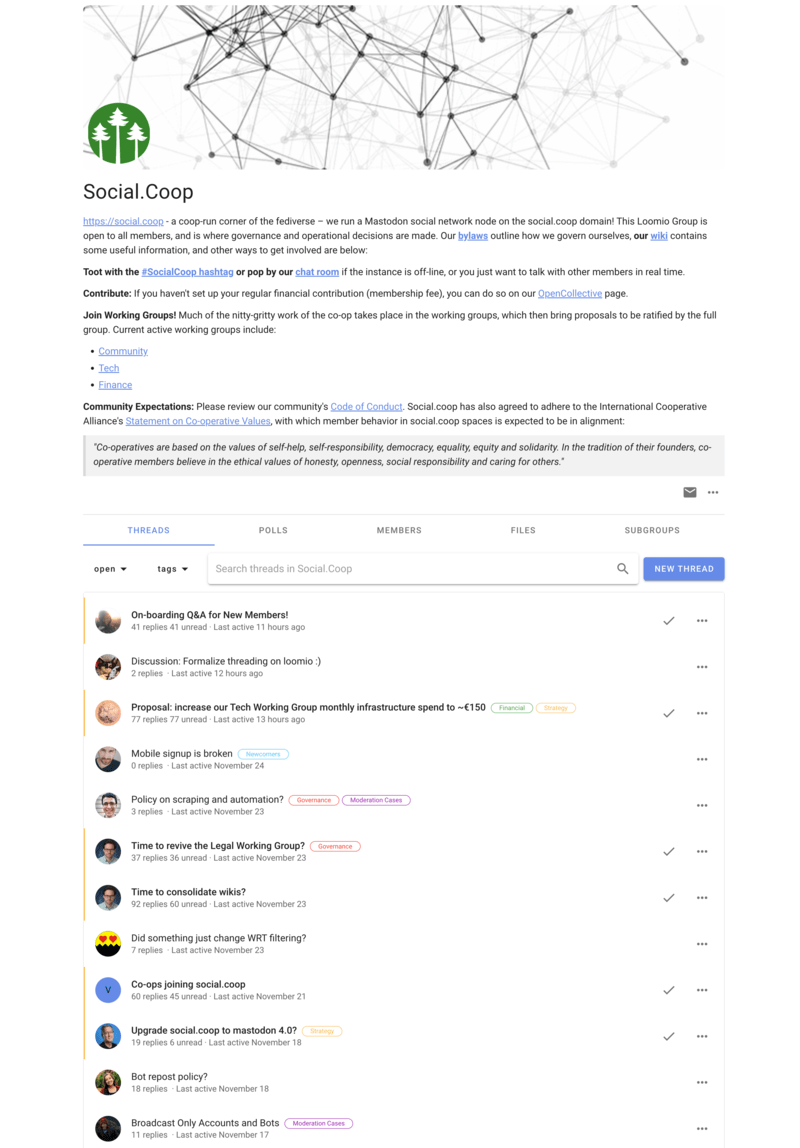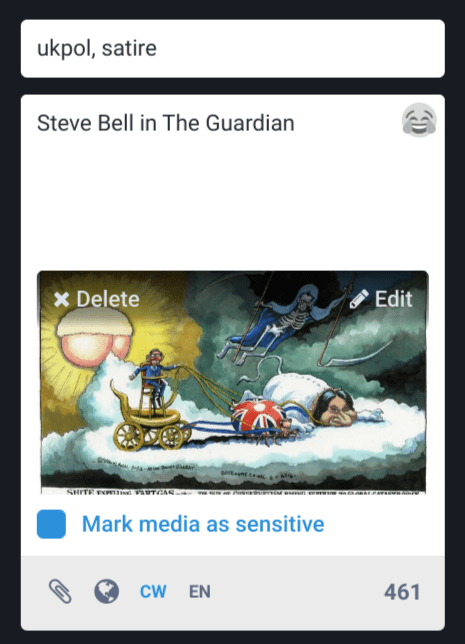TB872: Ubuntu and Pratītyasamutpāda
Note: this is a post reflecting on one of the modules of my MSc in Systems Thinking in Practice. You can see all of the related posts in this category.
A couple of weeks ago, I came across this image as a screenshot on the Fediverse (Athena, 2024):

I think this is somewhat shocking to anyone who perhaps doesn’t live in a city and actually knows their neighbours, but I should imagine it’s incomprehensible to anyone who lives in a tight-knit community.I’m using this as a way into discussing two non-western concepts, the southern African idea of ubuntu, and the Buddhist idea of pratītyasamutpāda.
Ubuntu
Anyone reading this with a technical background might recognise the word ‘ubuntu’ as it is the name of a Linux distribution, and in fact that’s where I first came across the word. From the Ubuntu website:
Ubuntu is an ancient African word meaning ‘humanity to others’. It is often described as reminding us that ‘I am what I am because of who we all are’. We bring the spirit of Ubuntu to the world of computers and software. The Ubuntu distribution represents the best of what the world’s software community has shared with the world.
About the Ubuntu project (n.d.)
We’re not provided with readings in the course text or module information directly, but rather directed to ‘optional’ readings which I may come back to:
- Bolden, R. (2014) ‘Ubuntu’, in Coghlan, D. and Brydon-Miller, M. (eds.) The SAGE encyclopedia of action research. London: SAGE Publications Ltd, doi: 10.4135/9781446294406.
- Mackay, V. (2018) ‘Through the eye of a fly: action research as a support for the South African National Literacy Campaign’, Systemic practice and action research, 31(4), pp. 375–393.
- Mamman, A. and Zakaria, H.B. (2016) ‘Spirituality and ubuntu as the foundation for building African institutions, organizations and leaders’, Journal of Management, Spirituality and Religion, 13(3), pp. 246–265.
- Woermann, M. and Engelbrecht, S. (2019) ‘The ubuntu challenge to business: from stakeholders to relationholders’, Journal of Business Ethics, 157(1), pp. 27–44.
As I mentioned in my first post about this part of the module, the focus on older white guys is disappointing.
It’s worth noting that the word for the concept usually referred to as ‘ubuntu’ is given a different name in other Bantu languages. Going further than the Ubuntu (software) project’s definition, is one provided in 2020 by the African Journal of Social Work:
A collection of values and practices that people of Africa or of African origin view as making people authentic human beings. While the nuances of these values and practices vary across different ethnic groups, they all point to one thing – an authentic individual human being is part of a larger and more significant relational, communal, societal, environmental and spiritual world.
‘Ubuntu philosophy’ (2024)
In our hyper-rationalist, neoliberal, individualistic society, we not only do not foreground this approach to life, but we actively downplay it. Authenticity is couched in the language of ‘free speech’ and what you qua individual have the ‘power’ and/or ‘freedom’ to express. Although it can be traced back further, I’m sure, some of this is due to Enlightenment thinking, which stresses the importance of reason above all else.
It’s perhaps best summed up by the Cartesian statement, “I think therefore I am” which centres the world on the individual and their ability to understand the world. As the late Desmond Tutu points out in the quotation below, ubuntu runs counter to this:
We belong in a bundle of life. We say, ‘a person is a person through other people’. It is not, ‘I think therefore I am’. It says rather: ‘I am human because I belong.’ I participate, I share. A person with ubuntu is open and available to others, affirming of others, does not feel threatened that others are able and good; for he or she has a proper self-assurance that comes from knowing that he or she belongs in a greater whole and is diminished when others are humiliated or diminished, when others are tortured or oppressed, or treated as if they were less than they are.
The Open University (2021)
Seeing such a rich and important concept as ubuntu be relegated to a page on ‘non-western traditions’ in the course materials feels akin to a hand-waving mention of cooperatives as ‘other forms of organising’ when talking about businesses. Almost 1.5 billion people live in Africa, and at least 12% of the world’s population is a member of one of 3 million cooperatives. When we choose to prioritise and focus on one kind of approach to life and organising, we are choosing to de-prioritise and take focus away from others.
In terms of social learning systems for managing change, ubuntu is probably exactly the kind of approach we need to engender. Helping people realise that they belong to a group is an extremely powerful way to engender a sense of responsibility and therefore to enact change.
Pratītyasamutpāda
Whereas ubuntu is a familar concept to me, the Buddhist idea pratītyasamutpāda is entirely new. It’s a Sanskri word usually translated as “dependent origination”, or “dependent arising” meaning that everything depends upon everything else: “if this exists, that exists; if this ceases to exist, that also ceases to exist” (‘Pratītyasamutpāda’, 2024)
As the Buddhist monk Thich Naht Hanh is quoted as saying, unlike the Humean notion of cause and effect, this approach considers cause and effect together, as “everything is a result of multiple causes and conditions”:
Pratītyasamutpāda is sometimes called the teaching of cause and effect, but that can be misleading. because we usually think of cause and effect as separate entities, with cause always preceding effect, and one cause leading to one effect … [instead] cause and effect co-arise and everything is a result of multiple causes and conditions. The egg is in the chicken, and the chicken is in the egg. Chicken and egg arise in mutual dependence. Neither is independent.
The Open University. (2021)
Again, the notion of pratītyasamutpāda is known by different terms in various cultures and languages. For example, Joanna Macy, the American systems thinker and environmental activist refers to it as paṭicca samuppāda which is the name for the same idea in the Pali language. One obvious example of where this is relevant is in the ‘causal loop’ or ‘multiple cause’ diagrams which are common in systems thinking and which I’ve included in previous posts.
Macy explains how her buddhist beliefs, systems thinking, and environmental activism all come together in the following quotation, taken from the course materials:
Systems science goes farther in challenging old assumptions about a separate, continuous self, by showing that there is no logical or scientific basis for construing one part of the experienced world as “me” and the rest as “other.” That is so because as open, self-organizing systems, our very breathing, acting, and thinking arise in interaction with our shared world through the currents of matter, energy, and information that move through us and sustain us. In the web of relationships that sustain these activities there is no line of demarcation. As systems theorists say, there is no categorical ‘I’ set over against a categorical ‘you’ or ‘it’.
The Open University. (2021)
If ubuntu is “I am because we are” then pratītyasamutpāda can be seen as widening this to “I am because the world (or the universe) is”. It’s a somewhat mystical and spiritual approach to life, but then perhaps seeing everything as anything other than indivisible is at the root of our problems. It has a number of philosophical implications, from the ontological (i.e. “all phenomena arise from other, pre-existing phenomena, and in turn current phenomena condition future phenomena”), to the epistemological (i.e. “there are no permanent and stable things”) (‘Pratītyasamutpāda’, 2024).
In passing, I note that this reminds me somewhat of the fragments that we have of Parmenides, who introduces two paths, or ways of inquiry; one being the way of ‘What Is’ which is “now together entire,/ single, continuous” Palmer, J. (2020). He continues, citing the ‘goddess’ to which he is in conversation:
Nor is it divided, since it is all alike;/ and it is not any more there, which would keep it from holding together,/ nor any worse, but it is all replete with What Is./ Therefore it is all continuous: for What Is draws to What Is.”
Palmer, J. (2020)
It would be interesting to look for approaches to systems thinking and social learning in pre-Socratic texts. But in terms of applying the concept of pratītyasamutpāda to social learning systems for managing change, what has struck me is that it provides a rationale for using causal loop / multiple cause diagrams, not just because they’re useful but because they introduce a different, more integrated, and more connected way of looking at the world.
References
- About the Ubuntu project (n.d.) Available at: https://ubuntu.com/about (Accessed: 28 February 2024).
- Athena(@[email protected]) (2024) Mastodon. Available at: https://mastodon.social/@Climatehistories/111928988180348991 (Accessed: 28 February 2024).
- Palmer, J. (2020) ‘Parmenides’, in E.N. Zalta (ed.) The Stanford Encyclopedia of Philosophy. Winter 2020. Metaphysics Research Lab, Stanford University. Available at: https://plato.stanford.edu/archives/win2020/entries/parmenides (Accessed: 28 February 2024).
- ‘Pratītyasamutpāda’ (2024) Wikipedia. Available at: https://en.wikipedia.org/w/index.php?title=Prat%C4%ABtyasamutp%C4%81da&oldid=1197815100 (Accessed: 28 February 2024).
- ‘Ubuntu philosophy’ (2024) Wikipedia. Available at: https://en.wikipedia.org/w/index.php?title=Ubuntu_philosophy&oldid=1204679223 (Accessed: 28 February 2024).CloseDeleteEdit
- The Open University. (2021). ‘3.3.6 Non-Western traditions’, TB872: Managing change with systems thinking in practice. Available at https://learn2.open.ac.uk/mod/oucontent/view.php?id=2171593§ion=3.3.6 (Accessed 25 February 2024).



